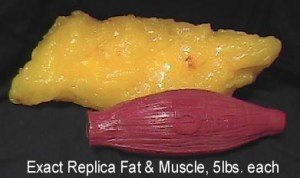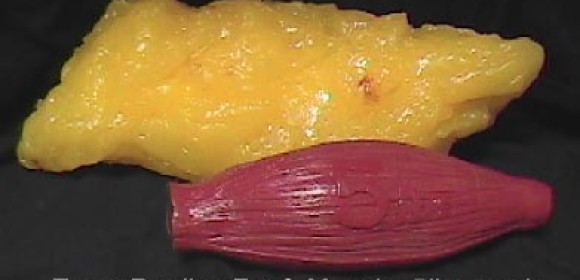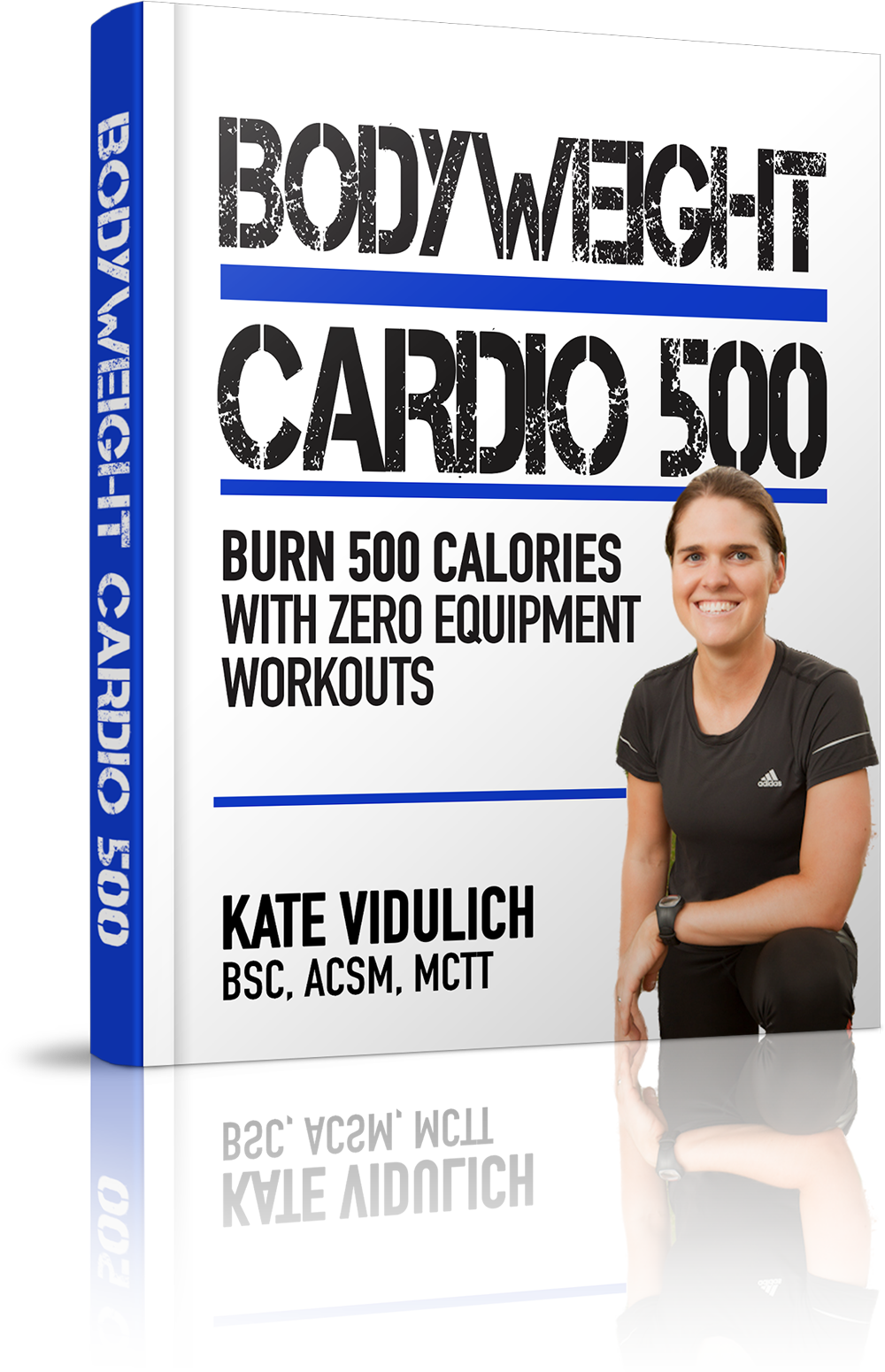You’ve heard the saying “muscle weighs more than fat”.
In fact, I overheard this conversation between two women last week while I was hanging at Starbucks:
Chick A: “I’ve put on two pounds this week since I started strength training. Do you think that is normal?!”
Chick B: “Well, don’t worry. I’m sure it is just muscle, and it weighs more than fat.”
At that point, I nearly spat out my coffee. And not because it was Starbucks… ![]()
So is there any truth to this statement?
No. It’s just another myth.
Muscle DOES NOT weigh more than fat.
It’s just another commonly cited gym cliché that is misunderstood and misused.
Shocking, right?!
Don’t you think it sounds like one of those tricks your dad would play on you as a kid?
“OK Kate, what weighs more? A pound of feathers or a pound of lead?”
As a puzzled, expressionless ten year-old, I would rack my brain hoping the answer would magically come to me. I knew getting this one right meant I was smarter than the average kid. But these riddles got me every single time.
Obviously, this saying is just like one of those riddles gone wrong.
Listen. A pound of muscle weighs THE SAME as a pound of fat, no matter how you weigh it. I didn’t intend to trick you.
Here are 2 reasons why this statement is misunderstood:
Reason 1: Muscle Density
Muscle is DENSER than fat, which means it takes up less space than an equal mass of fat. It doesn’t mean it weighs more.
Fat is fluffy and giggly, and downright ugly. Muscle takes up less room in your jeans, and gives you a sexy, defined look. What would you prefer?
This is another reminder to keep your eyes off the scale, and use your clothes as the measure.
Just last week, my client who religiously weighs herself every single morning (and mind you, it only fluctuates by a few pounds), was telling me she tried on an old pair of pants from a few years ago. She couldn’t zip up at the time, and so tossed them in the back of her wardrobe. Now, two years later they are loose!
Weight the same, pants are loose. Rock on.
Reason 2: Building Muscle Takes Time
Do you have any idea how long it takes to build serious, real muscle?
When you start a new training regime, don’t think you’re gaining weight because you put on muscle. Stop fooling yourself, and check you calorie intake. So called “healthy snacks” are loaded with more calories, sugars and fats than you could imagine.
It can take weeks to build lean muscle tissue, and even longer if you’re a chick. (Sorry, I’m just a sad as you are). Your body needs time to adapt and grow, and your body composition won’t change so quickly that the scale reflects a 2 pound increase of muscle in only a week.
Turns out, when most newcomers start a training regime, they overestimate the number of calories burned during training, and compensate by eating more.
Ever heard, “Well I did an hour of spinning this morning, so I can eat this piece of cake.”
That right there is the reason the number on the scale is going up.
Action Plan: Your Goal is to Build Muscle
Ok, so you know a pound of muscle and a pound of fat weigh the same, but you want more muscle as it takes up less space and looks hot.
Here’s a step-by-step plan to body transformation:
Step #1: Aim to Build Muscle
Rather than trying to lose weight and getting obsessed with that number, focus on getting strong and building muscle, as this will help you accelerate fat loss.
Muscle is more metabolically active compared to fat, meaning it uses more energy and calories. Therefore, having more muscle boosts your metabolism. And it looks sexy.
Don’t forget about the additional health benefits to building muscle, like increased bone density, healthy joints and a boost in self-esteem.
Do metabolic resistance training workouts that will help you accelerate fat loss by burning a ton of calories in less time, while boosting your afterburn effect.
Step #2: Beware of Scales
The scales indicate your total body mass. Not your self worth. It doesn’t differentiate between muscle mass, fat, water or bones. So don’t get hung up and obsessed with the number – it’s not worth it.
Determining your success or failure, based upon a meaningless number on the scale is bad news. Quit this habit and focus on performance-based goals, like increasing your numbers of the deadlift, push up or pull ups.
Step #3: Don’t Reward Yourself With Food
This is danger zone material. “Oh goody, I just did a really hard workout so I deserve to eat that huge muffin.”
No no no!
Sure, you might be able to get away with a cheat like that every now and then, but this is a terrible habit.
Before you know it, you’ll be rewarding yourself for everything – with food.
“I’m going to do a massive workout tomorrow, so I can eat bread at dinner tonight.”
“I did a tough spinning class, so let’s eat ice cream to celebrate.”
“I had a bad day so I deserve a piece of cheesecake, fries, a burger or three and a glass of wine.”
Actually, no. You don’t deserve anything.
Stop eating for emotional reasons. I get it. Food is a great comfort when things go wrong in your world. Instead of using hormonal changes and exercise as excuses to eat whatever you like and trying to justify bad food choices, feed your body nutritious whole foods.
You’ll have more energy, find it easier to control your cravings and you’ll feel awesome.
The Final Word
Muscle does not weigh more than fat, but it is denser, takes up less space than an equal mass of belly fat and looks damn sexy. Plus, the health benefits of adding muscle are endless. Sounds like a good enough reason to make it happen?
Of course.
Make sure you keep track of your training progress, either in a journal or diary. Taking snaps and comparing these over time will show changes in your body composition, which is more helpful than obsessing over the numbers day to day.
Think big picture. Don’t get hung up on the minor details. Where ever you are now, is where you are supposed to be. Take responsibility, accept it and get back to achieving your goals.
KV
PS. You can get the 21 Day Rapid Results Accelerator Program here to jumpstart your fat loss.













4 Replies
Thanks for the great information Kate was really helpful. Have a wonderful day.
I think what people mean when they say that muscle weighs more than fat, is that they can’t tell any real difference in size, but they weigh more.
For the same volume, muscle weighs more than fat.
Sorry to chime in again, but according to the dictionary:
“weight
1. a body’s relative mass or the quantity of matter contained by it, giving rise to a downward force; the heaviness of a person or thing.”
Since the relative mass of muscle is greater than that of fat, then yes, muscle is heavier than fat.
Your example of the riddle “Heavier a pound of feathers or a pound of bricks” does not take volume into account. You seem to be saying that everything weighs the same as everything else. A pound of lead weighs the same as a pound of fat, too.
Kate<
Great post and well said. I will share this with my clients.
Karen